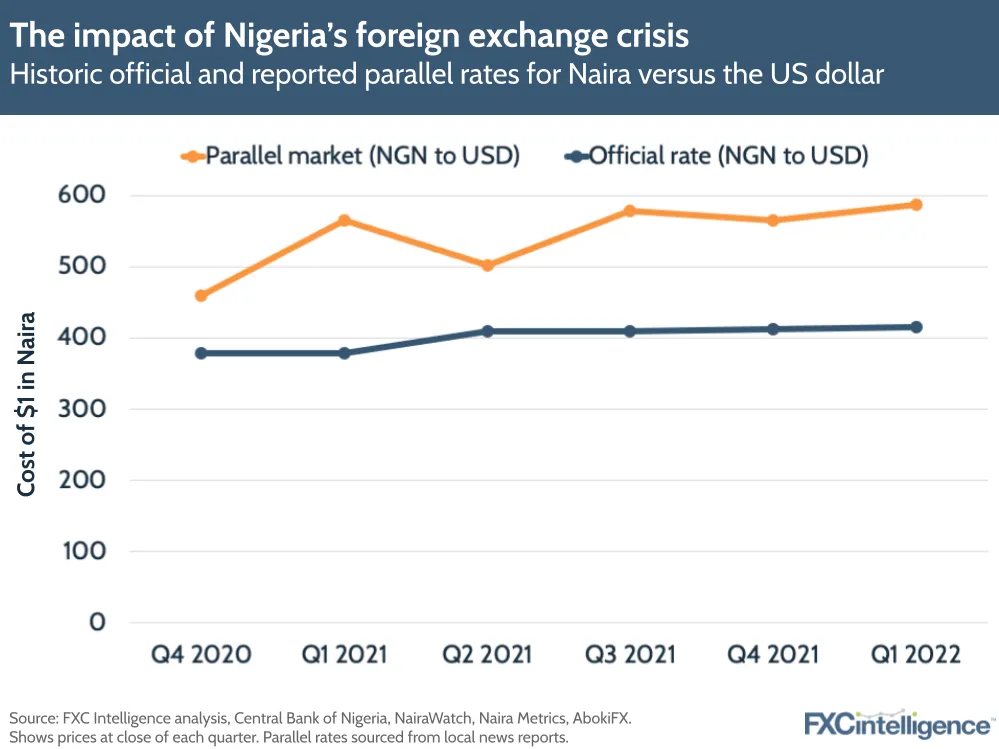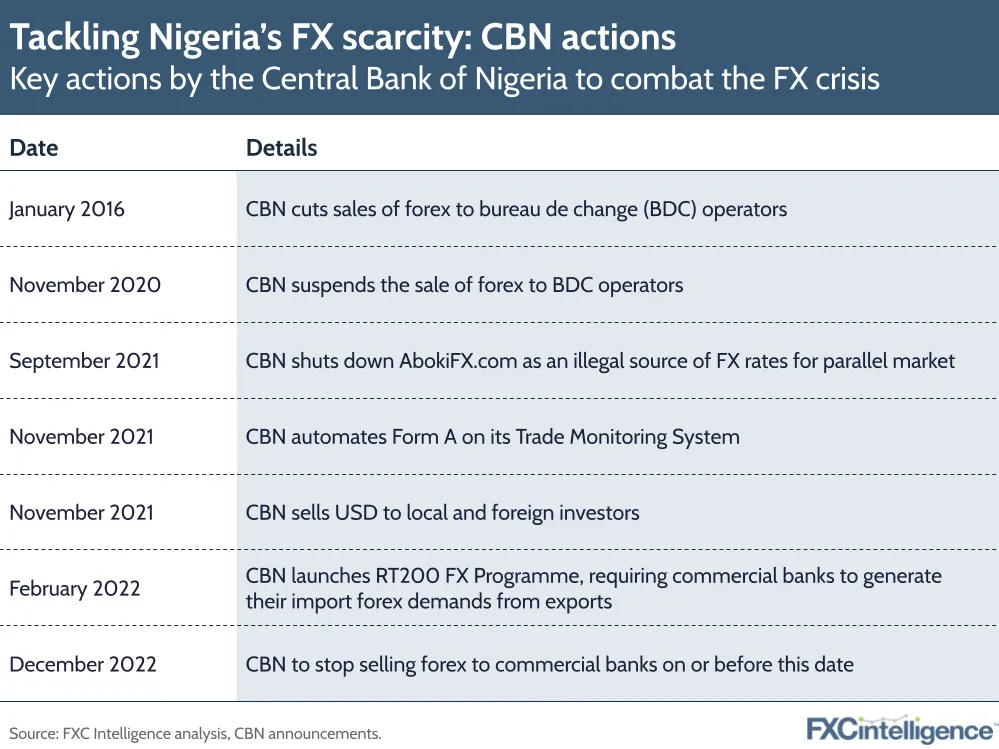Nigeria is experiencing a foreign exchange crisis, as FX scarcity drives up the cost of exchanging Naira into US dollars, particularly in the parallel market.
Nigeria’s currency, the Naira, is currently in distress, having experienced significant volatility and several past devaluations. This has produced numerous negative attendant economic effects, but recent developments have exacerbated the issue.
In the last few months, the Naira has depreciated significantly in the parallel market while only a slight change has been noticed on the I&E platform – the official platform acknowledged by the Central Bank of Nigeria.
The Naira’s depreciation in the parallel market has been attributed to an increasing forex demand that does not equate to supply from the bank. Forex demand is primarily to import manufacturing materials and pay bills such as school fees, medical services and tax debt – needs that official supply has not met.
The parallel market has therefore been sought by individuals and businesses in dire need of forex, who are buying at expensive rates. This has put pressure on the Naira, increasing parallel market rates.
Nigeria’s FX scarcity: The situation
The lingering FX scarcity has been an ongoing problem for about two years, which has led to a high inflation rate and knock-on impacts to the wider economy.
Manufacturers have had to use the parallel market to pay for imported raw materials, increasing the cost of production and therefore the price of end products – ultimately passing the cost on to end consumers.
In a bid to help impacted companies and reduce forex demand pressure, in March 2022 Nigeria’s Federal Inland Revenue Service (FIRS) gave a one-month concession to companies with outstanding foreign currency tax liabilities, enabling them to pay in Naira due to the FX scarcity.
Meanwhile, international students who need forex to pay fees and for upkeep have also been impacted by Nigeria’s FX scarcity. Many have been using parallel markets to pay their fees and have turned to peer-to-peer (P2P) crypto transactions for living expenses.
Cryptocurrency has also been adopted by manufacturers to pay for some transactions, although there are restrictions on its use in Nigeria: in 2021, the Central Bank of Nigeria banned financial institutions from processing cryptocurrency.

Why Nigeria is experiencing a forex shortage
There are several reasons for Nigeria’s FX scarcity, including inconsistent monetary policies and regulations, but at the core is one issue: Nigeria’s heavy dependence on oil.
Over the years, Nigeria has relied on earnings from oil sales to receive foreign exchange. According to a recent report by the International Monetary Fund titled Nigeria: Selected Issues Paper, the Nigerian economy has remained highly dependent on oil with limited diversification. In 2020, the total number of export products from Nigeria was 205, compared with an average of 258 for Sub Saharan Africa.
A diversified economy produces products for export and earns foreign exchange from those exports. Oil is essentially the country’s only major exportable product, so forex availability in Nigeria is largely dictated by oil sales.
In times of high oil demand, this poses less of a problem, however the Covid-19 pandemic and resulting global lockdowns in 2020 had an adverse effect on oil sales globally as use of transport reduced. This resulted in a forex shortage in Nigeria, and so led to the knock-on rise in the parallel market that we are now seeing.
Cap on monthly online transactions
While oil prices are the main driver of FX scarcity in Nigeria, some institutional decisions have exacerbated the problem.
Some commercial banks in Nigeria have limited customers’ access to forex by putting a cap on online international transactions using Naira debit cards, which puts a further strain on the limited forex supply. The limit used to be $500, which was reduced to $200 in early 2020 and $100 in 2021. In some cases, it is more restrictive: First Bank of Nigeria has an online transaction cap of $50 per month, while Guaranty Trust bank, Zenith, UBA and a host of others cap transactions at $20 per month. Naira cards have also been suspended from cash withdrawals and point of sale transactions internationally.
To counter the inevitable issues that such narrow restrictions create, commercial banks have made it possible for customers to open a domiciliary account that provides access to foreign currency debit cards in US dollar, pound sterling or euro. However, holders of these accounts cannot make online transfers exceeding $10,000, and these must be funded by cash deposits or wire transfers in the relevant currency. Cash withdrawals, meanwhile, are only available when there has been a cash deposit and cannot exceed the amount deposited.
How the Central Bank of Nigeria is responding
The Central Bank of Nigeria (CBN) has taken a number of steps to try and improve foreign currency reserves in the country and boost the liquidity of commercial banks. These have had some implications for remittance operations. Below are some of the actions taken by the CBN to combat the situation.

Disengagement of bureau de change operators
In January 2016, the CBN reduced the sale of forex to bureau de change (BDC) operators in order to eliminate excess liquidity in the system. However, in November 2020, it went further when it suspended sales of forex to BDC operators entirely.
This was enacted to stabilise the foreign exchange market, as well as block the actions of unofficial remittance operations that had compromised the impact of prior FX-related policies.
Sourcing forex from diaspora remittances
Another approach the CBN took was to source foreign exchange from remittances sent by the Nigerian diaspora. Nigeria has a large number of migrant workers in other parts of the world who send money back home to family and friends. This makes it the tenth largest recipient of personal remittances globally, with $17.2bn received in 2020, according to the World Bank.
In December 2020, the CBN issued a ban on remittance payouts in Naira cash. Instead, inbound remittances had to be received in US dollars in cash or be paid to a domiciliary account approved by international money transfer operators such as Western Union and MoneyGram.
In March 2021, the CBN also incentivised receiving payments in dollars through its Naira 4 Dollar Scheme, which paid remittance recipients an additional 5 Naira for every US dollar they received.
Automation of Form A
In another attempt to ease access to forex for businesses and individuals, the CBN digitised the process through which forex was applied for. Previously, businesses and individuals had been required to complete a paper application known as Form A. However, in November 2021 this was replaced by an electronic application that only required applicants to provide their bank verification number in order to gain access.
This was effective for a short while, but after some time issues began to arise. Several applications started getting declined, while those that had been moved to the disbursement stage stayed there for as long as 6-8 weeks without disbursement due to insufficient forex.
RT200 FX Policy
The CBN has also introduced another policy called Race to US$200 billion in FX Repatriation, or the RT200 FX Programme. This is designed to create new strategies for the generation of stable inflows of forex from non-oil exports within the next 3 – 5 years. It does this by making commercial banks responsible for generating their import forex demands from export proceeds. As part of this, the CBN will cease to sell forex to commercial banks on or before December 2022.
Implications for cross-border payment companies
The ongoing FX scarcity in Nigeria has had inevitable knock-on impacts for remittance and money transfer players operating in Nigeria. Here are some of the most notable.
Shutdown of some services to Nigeria
Some cross-border companies have had to stop inward and outward Naira remittance services to Nigeria altogether as a result of the CBN’s regulatory policies enacted in response to the FX crisis.
Wise is a notable example of this. While the company does still enable US dollar-based transfers to the company, it no longer supports sending Naira to the country.
Multicurrency wallets
Multicurrency wallets have proved to be an effective solution for some. Cross-border companies such as Chipper Cash have made it easier for companies to initiate P2P and B2B cross-border payments through their multicurrency wallets. These typically also provide lower rates than the parallel FX market.
Increase in blockchain transactions
Due to the non-availability of forex, businesses have sought out alternative methods, including blockchain-based solutions using stablecoins. One provider of such services is Cowrie, which provides cross-border payments using NGNT, a stablecoin pegged to the Naira that is developed on the Stellar blockchain. Using this, companies can quickly and easily transfer NGNT into fiat and other cryptocurrencies, providing a cheaper alternative to parallel forex rates.
Investment services
The current Naira volatility has also led to an increase in Nigerian individuals and businesses holding foreign shares or cryptocurrencies, as well as those engaging in exchange-traded funds.
Several African cross-border payment companies are responding to this demand by offering supporting products. For example, Nigerian multicurrency account Switch by Sterling includes investment products among its range of services.
Solving the Nigerian forex crisis
It is apparent that for the Naira to gain value and the forex situation to improve in a sustainable manner, Nigeria needs to have a diversified economy that is active in international trade besides oil.
Promoting more exports from Nigeria will provide further sources of foreign exchange, which will ease pressure on the currency.
In order to help with this, businesses in Nigeria can leverage the African Continental Free Trade Area (AfCFTA) treaty, which eliminates trade tariffs within the continent and reduces heavy dependence on foriegn currencies through instant cross-border payments in local African currencies.
Unfortunately, many of Nigeria’s small and medium-sized firms are unaware of AfCFTA’s benefits, with a 2021 Centre for the Study of the Economies in Africa survey finding that over 60% of SMEs are unaware of the treaty.
While there are potential benefits of raising awareness about the ease of exporting for businesses, in the meantime financial alternatives such as multicurrency wallets and blockchain-based money transfers are likely to continue to prove invaluable to those looking to reduce the impact of FX scarcity in Nigeria.



